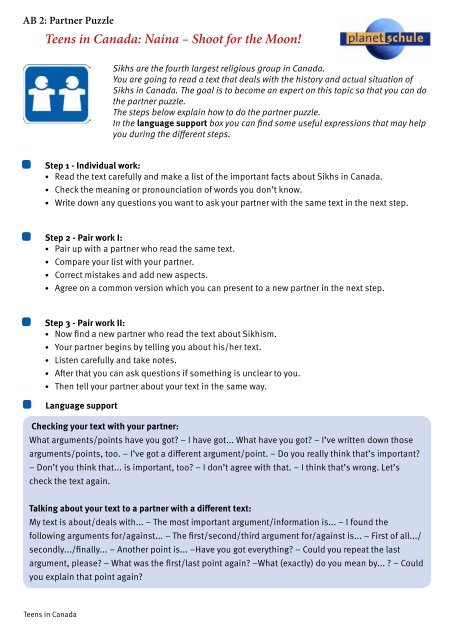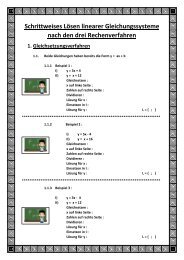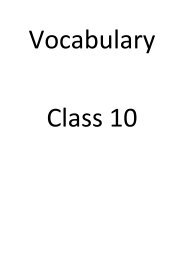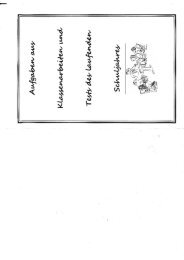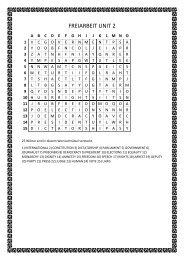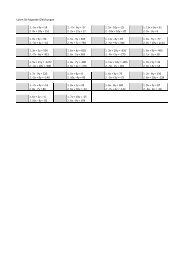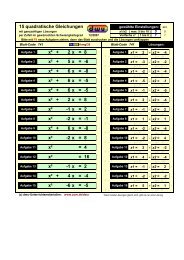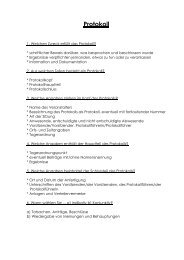Teenagers in Canada (18 Dateien zusammengefügt)
Create successful ePaper yourself
Turn your PDF publications into a flip-book with our unique Google optimized e-Paper software.
AB 2: Partner Puzzle<br />
Teens <strong>in</strong> <strong>Canada</strong>: Na<strong>in</strong>a – Shoot for the Moon!<br />
Sikhs are the fourth largest religious group <strong>in</strong> <strong>Canada</strong>.<br />
You are go<strong>in</strong>g to read a text that deals with the history and actual situation of<br />
Sikhs <strong>in</strong> <strong>Canada</strong>. The goal is to become an expert on this topic so that you can do<br />
the partner puzzle.<br />
The steps below expla<strong>in</strong> how to do the partner puzzle.<br />
In the language support box you can <strong>in</strong>d some useful expressions that may help<br />
you dur<strong>in</strong>g the diferent steps.<br />
Step 1 - Individual work:<br />
• Read the text carefully and make a list of the important facts about Sikhs <strong>in</strong> <strong>Canada</strong>.<br />
• Check the mean<strong>in</strong>g or pronounciation of words you don’t know.<br />
• Write down any questions you want to ask your partner with the same text <strong>in</strong> the next step.<br />
Step 2 - Pair work I:<br />
• Pair up with a partner who read the same text.<br />
• Compare your list with your partner.<br />
• Correct mistakes and add new aspects.<br />
• Agree on a common version which you can present to a new partner <strong>in</strong> the next step.<br />
Step 3 - Pair work II:<br />
• Now <strong>in</strong>d a new partner who read the text about Sikhism.<br />
• Your partner beg<strong>in</strong>s by tell<strong>in</strong>g you about his/her text.<br />
• Listen carefully and take notes.<br />
• Ater that you can ask questions if someth<strong>in</strong>g is unclear to you.<br />
• Then tell your partner about your text <strong>in</strong> the same way.<br />
Language support<br />
Check<strong>in</strong>g your text with your partner:<br />
What arguments/po<strong>in</strong>ts have you got? – I have got... What have you got? – I’ve written down those<br />
arguments/po<strong>in</strong>ts, too. – I’ve got a diferent argument/po<strong>in</strong>t. – Do you really th<strong>in</strong>k that’s important?<br />
– Don’t you th<strong>in</strong>k that... is important, too? – I don’t agree with that. – I th<strong>in</strong>k that’s wrong. Let’s<br />
check the text aga<strong>in</strong>.<br />
Talk<strong>in</strong>g about your text to a partner with a diferent text:<br />
My text is about/deals with... – The most important argument/<strong>in</strong>formation is... – I found the<br />
follow<strong>in</strong>g arguments for/aga<strong>in</strong>st... – The irst/second/third argument for/aga<strong>in</strong>st is... – First of all.../<br />
secondly.../<strong>in</strong>ally... – Another po<strong>in</strong>t is... –Have you got everyth<strong>in</strong>g? – Could you repeat the last<br />
argument, please? – What was the irst/last po<strong>in</strong>t aga<strong>in</strong>? –What (exactly) do you mean by... ? – Could<br />
you expla<strong>in</strong> that po<strong>in</strong>t aga<strong>in</strong>?<br />
Teens <strong>in</strong> <strong>Canada</strong>


